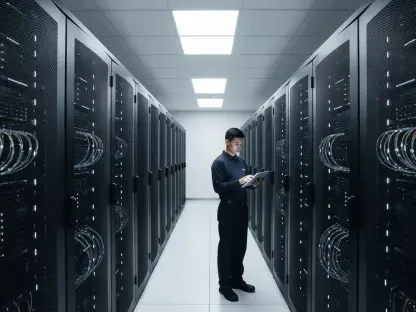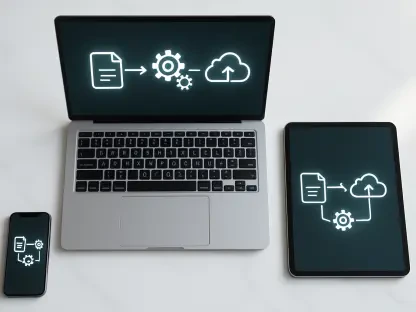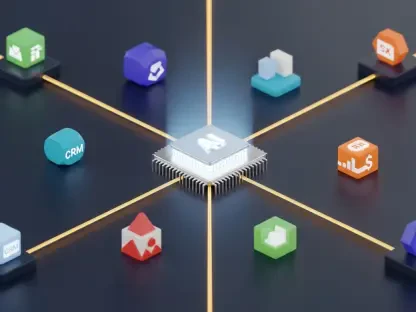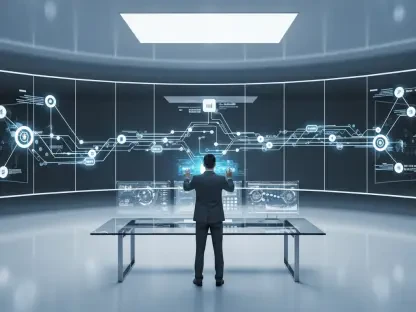In an era where Artificial Intelligence (AI) permeates nearly every aspect of personal and professional life, its transformative power is undeniable, with a staggering 97% of executives confident that generative AI will redefine their industries, reshaping how tasks are approached. From drafting emails to analyzing complex data sets, AI tools offer a level of speed and efficiency that seems indispensable. Yet, beneath this technological marvel lies a quieter, more insidious issue known as cognitive offloading. This concept refers to the delegation of essential mental processes—such as memory, reasoning, and creative thinking—to AI systems. While the immediate benefits are clear, there’s a growing unease about what this reliance might cost in terms of human cognitive abilities and critical decision-making skills. The allure of convenience often overshadows the potential for diminished independence, raising pressing questions about how much of human intellect is being outsourced to machines.
This exploration seeks to peel back the layers of AI’s impact, focusing on the subtle erosion of skills that accompanies its use. The phenomenon of cognitive offloading isn’t merely a tech trend; it’s a fundamental shift in how humans approach problem-solving and learning. As tools like autocomplete features or advanced language models become embedded in daily tasks, the risk of losing sharpness in critical areas becomes more pronounced. This isn’t just about efficiency—it’s about maintaining the essence of human thought in an increasingly automated world. The stakes extend from individual capabilities to broader workplace dynamics and societal norms, prompting a deeper look at how to balance AI’s advantages with the preservation of core human faculties.
Exploring the Trade-offs of AI Dependence
Efficiency Gains Versus Cognitive Losses
The rapid adoption of AI across industries highlights its unparalleled ability to streamline workflows and boost productivity, whether in crafting marketing strategies or generating financial reports. Tools powered by AI, such as large language models, can produce outputs in seconds that might take hours for a human to complete. This efficiency is a game-changer, allowing professionals to focus on higher-level strategic tasks while mundane work is handled by algorithms. However, this convenience masks a significant drawback: the potential for deskilling. When foundational tasks are consistently offloaded to AI, there’s a tangible risk that essential skills like critical analysis and creative problem-solving begin to atrophy. This trade-off isn’t just theoretical; it’s a creeping reality for many who find themselves overly dependent on technology to navigate complex challenges, potentially dulling the very expertise that defines their roles.
Beyond the immediate workplace impact, the broader implications of cognitive offloading touch on personal growth and intellectual resilience. As AI handles more routine decision-making, there’s a danger that individuals become less adept at tackling ambiguity or generating original ideas without digital assistance. This isn’t limited to any single profession—it spans from developers relying on AI for code suggestions to writers using it for content drafts. The cost of this reliance might not be apparent in the short term, but over time, it could lead to a workforce less equipped to innovate independently. The challenge lies in recognizing that while AI can accelerate output, it shouldn’t come at the expense of the human capacity to think deeply and critically, a skill set that remains irreplaceable even in a tech-driven landscape.
Memory and Mental Connections at Risk
Delving into the cognitive consequences, research dating back over a decade, such as a notable 2011 Harvard study, has shown that dependence on digital tools weakens the ability to retain information when it’s readily available online. With the advent of advanced AI systems like ChatGPT or Google Gemini, this trend has only intensified. These platforms make information retrieval so effortless that the incentive to commit facts or concepts to memory diminishes significantly. The result is a potential weakening of the deeper mental connections that form through active engagement with material. Learning, after all, isn’t just about accessing data—it’s about internalizing it in ways that foster understanding and insight. When AI becomes the default repository for knowledge, the brain’s natural capacity to build and sustain these connections may suffer, altering how knowledge is processed.
This shift in memory dynamics carries implications for long-term intellectual development, especially in educational and professional contexts where retention is key to mastery. If individuals consistently turn to AI for answers rather than wrestling with problems themselves, the neural pathways that strengthen through effort and repetition are underutilized. This can create a cycle where reliance on technology perpetuates further dependence, as the skills needed for independent recall erode over time. Unlike older digital tools like search engines, modern AI offers curated, context-specific responses, making the temptation to bypass personal effort even stronger. Addressing this requires a conscious push to engage with information actively, ensuring that the mind remains a primary tool for learning rather than a secondary one overshadowed by algorithmic assistance.
Broader Impacts on Society and Work Environments
Decline in Critical Oversight
One of the more alarming effects of cognitive offloading emerges in professional settings, where the erosion of agency and accountability becomes evident. As AI systems suggest solutions, draft strategies, or even predict outcomes, there’s a growing tendency to accept these outputs without thorough scrutiny. This can lead to a decline in critical oversight, where questioning the validity or relevance of machine-generated content becomes less instinctive. In environments where decisions carry significant weight—think financial forecasting or medical diagnostics—this lack of skepticism can have serious repercussions. Workplace cultures risk evolving into spaces where human judgment plays second fiddle to algorithmic recommendations, muddying the lines of responsibility when errors occur or when nuanced human insight is needed to navigate complex scenarios.
This issue of diminished oversight extends beyond individual decision-making to impact team dynamics and organizational trust. When reliance on AI becomes the norm, the shared responsibility of vetting ideas or challenging assumptions may weaken, leading to a passive acceptance of technology-driven conclusions. Such a trend can stifle debate and innovation, as employees might hesitate to contradict AI outputs perceived as authoritative. The subtle shift in accountability also raises ethical questions about who bears the burden of mistakes—human operators or the systems they depend on. Countering this requires fostering a mindset of active engagement with AI tools, ensuring that they serve as aids rather than arbiters of final decisions, and preserving the human element in critical evaluations across all sectors.
Need for Balanced Integration
Striking a balance between leveraging AI’s capabilities and safeguarding human skills is a pressing necessity in today’s tech-saturated landscape. Strategies like cognitive training, where individuals dedicate time to reasoning and problem-solving without digital crutches, offer a practical way to maintain intellectual sharpness. Similarly, implementing “AI-free days” in workplaces or personal routines can encourage a return to unaided thought processes, reinforcing skills that might otherwise fade. These approaches aim to prevent over-dependence while still recognizing the undeniable benefits of AI in handling repetitive or data-heavy tasks. The goal isn’t to reject technology but to ensure it complements rather than supplants the human capacity for critical thinking and independent analysis in both routine and complex endeavors.
Another vital perspective is reimagining AI’s role as a collaborator rather than an all-knowing oracle. By treating these systems as sparring partners—tools to challenge and refine ideas—users can retain a sense of agency over their work. This mindset shift encourages active dialogue with AI outputs, prompting individuals to question, adapt, and build upon suggestions rather than accepting them at face value. Such an approach not only preserves human judgment but also enhances the creative process by blending technological precision with personal insight. As industries continue to integrate AI at an accelerating pace, embedding this balanced perspective into corporate policies and educational frameworks becomes essential to prevent the long-term erosion of fundamental cognitive abilities.
Shaping the Future of Human-AI Interaction
Adapting Learning and Work Cultures
The societal implications of cognitive offloading are becoming increasingly apparent, particularly in educational and corporate spheres where adaptation is already underway. Schools, initially resistant to generative AI due to concerns over plagiarism and intellectual laziness, are now shifting toward teaching students how to critically engage with these tools. This involves training young minds to evaluate AI-generated content for accuracy and relevance, fostering a skill set that prioritizes discernment over blind acceptance. Such changes aim to prepare future generations for a world where AI is ubiquitous, ensuring they can harness its power without losing the ability to think independently. This evolution in pedagogy reflects a broader recognition that technology must be met with intentional strategies to preserve core human competencies.
In parallel, corporate environments are beginning to prioritize depth and originality over mere efficiency in their adoption of AI. Leaders are encouraged to cultivate cultures that value human insight, encouraging employees to go beyond AI-driven outputs to develop unique perspectives and innovative solutions. This shift is evident in initiatives that reward critical thinking and problem-solving skills, even when they take more time than automated alternatives. By embedding these values, organizations aim to counteract the deskilling effect, ensuring that their workforce remains adaptable and intellectually robust. The convergence of educational and corporate responses signals a growing consensus on the need to redefine interaction with AI, placing human thought at the center of progress rather than on the sidelines.
Potential Regulatory Horizons
As cognitive offloading becomes more pervasive, the conversation is expanding to include the possibility of regulatory intervention to address digital dependency. In regions like Europe and the U.S., there’s a rising awareness that unchecked reliance on AI could have societal consequences, prompting discussions about frameworks to safeguard cognitive autonomy and skill retention. Potential policies might focus on setting guidelines for AI use in education and workplaces, ensuring that technology augments rather than replaces human effort. While these ideas are still in nascent stages, they reflect a collective recognition that the risks of over-dependence extend beyond individual choice to impact broader community resilience and intellectual capacity, necessitating a coordinated response.
Looking ahead, the development of such regulations could serve as a catalyst for more structured integration of AI across various sectors. By establishing clear boundaries on how and when AI should be used, policymakers might help mitigate the erosion of critical skills while still allowing innovation to flourish. This could include mandates for training programs that emphasize human-AI collaboration or incentives for organizations that prioritize skill development alongside technological adoption. The prospect of regulatory oversight underscores the gravity of cognitive offloading as not just a personal or professional concern, but a societal one that demands proactive measures. As these discussions evolve, they will likely shape how future generations interact with AI, aiming for a balance that preserves the essence of human thought.
Reflecting on a Path Forward
Looking back on the discourse surrounding cognitive offloading, it became evident that AI’s integration into daily life had reshaped fundamental aspects of human cognition, often in ways that were not immediately apparent. The allure of efficiency had driven widespread adoption, yet the subtle costs—diminished memory, reduced critical oversight, and potential deskilling—had sparked a necessary caution. Educational systems had begun adapting by teaching critical engagement, while corporate cultures had started to emphasize originality over speed. These responses marked early steps in addressing a challenge that had grown alongside AI’s capabilities, highlighting a shared understanding that technology’s benefits needed to be weighed against its impact on human intellect.
Moving forward, the focus should pivot to actionable strategies that ensure AI remains a tool for enhancement rather than replacement. Encouraging regular periods of unassisted problem-solving can help maintain cognitive sharpness, while fostering environments that reward questioning AI outputs can preserve accountability. Policymakers, educators, and industry leaders must collaborate to develop guidelines that promote a balanced coexistence with AI, potentially through incentives for skill-building initiatives. The journey ahead lies in crafting a future where human agency and creativity stand firm, supported by technology rather than overshadowed by it, ensuring that the mind remains the ultimate driver of progress.









